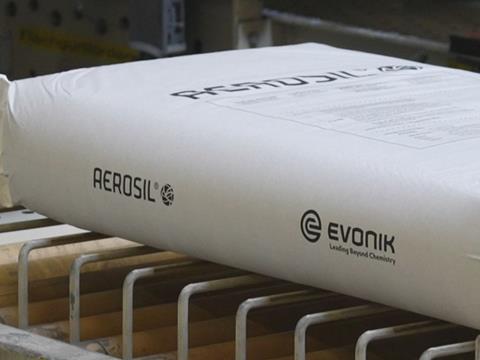
Mondi has created a recyclable pre-made paper bag for chemical powders in partnership with Evonik, developed to reduce the carbon footprint of packaging for fumed silica, used as a performance additive in various industrial and consumer applications.
The two companies began collaborating in 2022, aiming for a more sustainable bag solution. The result is a two-ply pre-made paper-based bag, removing a plastic-coated paper layer from the previous packaging.
The new design apparently results in less paper and plastic being used, with an overall weight reduction of 30% compared to the previous solution. Mondi says the paper bag also has a lower carbon footprint, assessed by its in-house life cycle-based PIA (Product Impact Assessment) tool.
The new bag was created using Mondi’s high porosity kraft paper, said to offer ‘superior strength, durability and stretch’. Mondi applies a small amount of spot coating to the bag, enabling Evonik to securely seal it after filling. The company adds that the bag is recyclable according to the CEPI v.3 test method and 4evergreen’s fibre-based packaging recyclability evaluation protocol.
Mondi’s kraft paper used for the new bags is not coated, which reportedly allows swift air release, reduces vacuum filling time, and the closing mechanism ensures tight and secure packaging. After the filling process, Evonik palletises the bags and shrink-wraps the pallets for storage and transport.
Mondi joined forces with Biedronka in January in a closed loop programme, aiming to to supply, collect, and reproduce its corrugated packaging in line with the retailer’s plastic consumption and CO2 emission targets. The programme involves waste paper being processed at a paper mill in Świecie, with the resulting paper delivered to one of Mondi’s Polish factories, where it is turned into corrugated cardboard packaging such as fruit and vegetable crates.
The following month, the company teamed up with Zwiesel Glas to package mouth-blown glassware in Mondi’s bespoke fibre-based packaging, designed to protect the fragile products while offering consumers a ‘premium’ unboxing experience. The pack constitutes an outer layer made from 190g uncoated containerboard paper, decorated with offset printing and embossed with the Zwiesel Glas logo and silver foil accents.
If you liked this story, you might also enjoy:
The ultimate guide to the Packaging and Packaging Waste Regulation in 2024
How are the top brands progressing on packaging sustainability?
Sustainable Innovation Report 2024: Current trends and future priorities
Everything you need to know about global plastic sustainability regulation














No comments yet